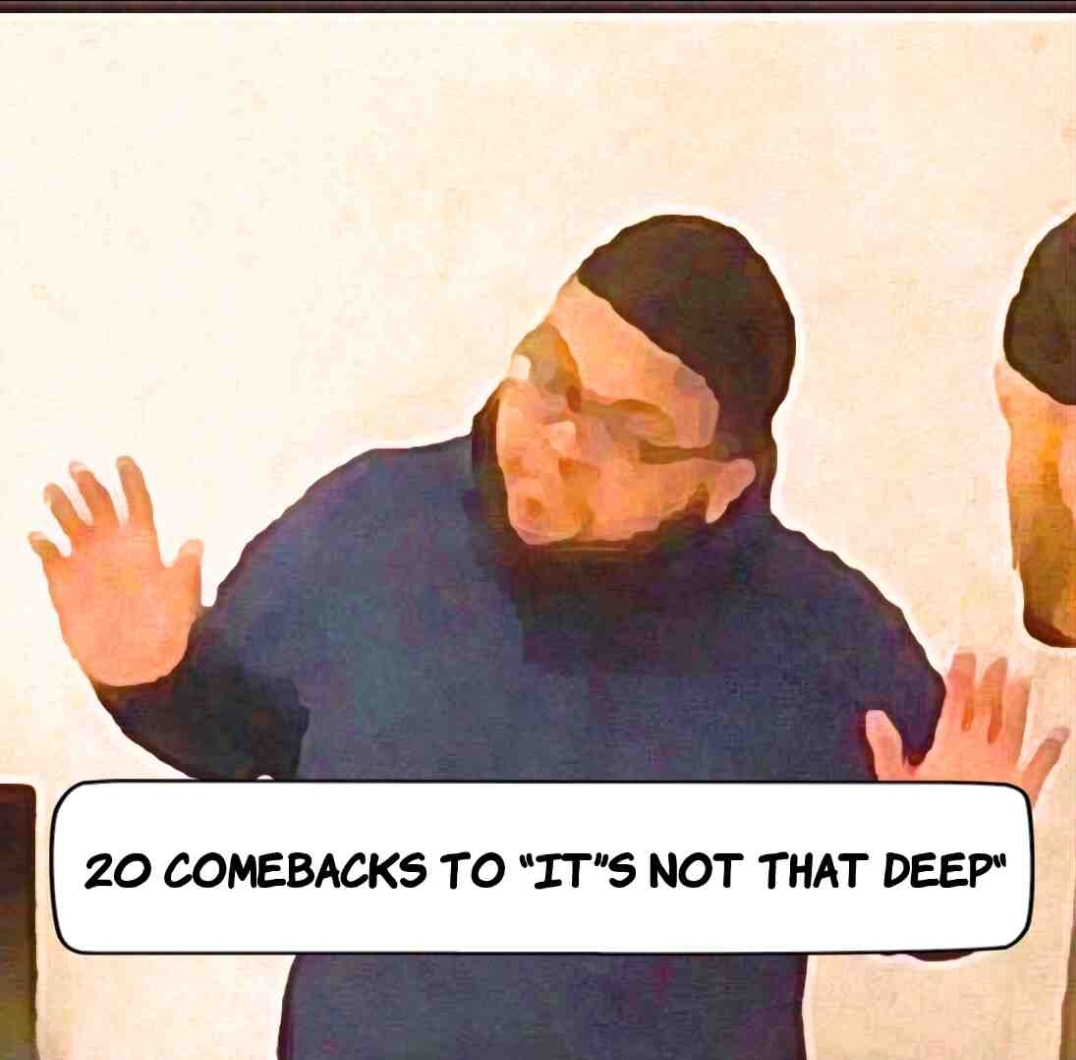“It’s not that deep” is the kind of phrase someone can use when they are gaslighting you.
I get it. Some people genuinely say, “It’s not that deep,” just to tell you not to take things too seriously or to not make a big deal out of something.
But saying “it’s not that deep” can sometimes come across as dismissive or derogatory, especially if you’re sharing something meaningful to the person.
Some people, when insulted with this phrase, will calmly express why the matter is essential to them. But you can instead give a comeback that will diss them.
List of the Best 20 Comebacks When Someone Tells You “It’s Not That Deep”
Here are the best comebacks to “it’s not that deep” that I’ve heard so far and how you can use them in your communication:
1. Neither is your understanding, apparently.

“Neither is your understanding apparently” is one of the sassiest ways you can respond when someone tells you it’s not that deep.
This response means that if they think what you said isn’t deep, then their ability to understand things deeply must also be shallow.
You can use this kind of reply when you want to show that you’re not just going to accept their dismissal. Here are other ways to put it:
- Well, neither seems to be your grasp of things, it seems.
- Looks like deep thinking isn’t your strong suit, either.
2. Says the one swimming in the shallow end.
If someone is trying to gaslight you by saying, “It’s not that deep,” you can respond with, “Says the one swimming in the shallow end.”
It turns the focus back on them. But what I like most about this comeback is that it is short and powerful.
You don’t need a long explanation to make your point. This comeback gets the job done in just a few words.
- That’s like staying in the kiddie pool.
- Sounds like you’re sticking to the shallow end.
3. If it’s not deep, why are you struggling to keep up?
Another comeback you can give when someone tells you it’s not that deep is, “If it’s not important, why are you finding it hard to understand?”
This reply shows that if the topic isn’t deep, why are they having trouble keeping up with the conversation?
Sometimes, all you need to diss someone is a funny way to show them that maybe the topic is more exciting and meaningful than they thought. You can even make it sound funnier with these alternatives:
- If it’s no biggie, why are you lagging?
- If it’s not a big deal, why are you tripping over it?
4. Maybe not for you, but clearly, it is for me.
Instead of trying to be sassy in your comeback when replying to someone who belittles you with “it’s not that deep,” you can actually calmly explain your differences.
“Well, for you, maybe it’s not deep, but for me, it is” is a polite way of reminding them that what you find essential or exciting might not be the same for them, and that’s totally fine.
Trust me, they’ll understand that you’re just on a different wavelength.
- Maybe it’s not a big deal to you, but it is to me.
5. Depth is subjective, just like your comprehension.
“Depth is subjective, just like your comprehension” is another clever comeback to “it’s not that deep.
And indeed, when you think about it, what seems profound or essential to one person might not seem that way to another.
By mentioning comprehension, it will show that maybe they just don’t get it or don’t understand the topic thoroughly. You can even add creativity to make the reply more witty, like in these examples:
- For Depth, everyone has their taste.
- I know that some see the surface, others plunge into the depths.
6. You’re just shallow

When someone says, “It’s not that deep,” they’re saying your thoughts aren’t necessary or severe.
So, firing back with “You’re just shallow” is a playful but intelligent way to tell them they’re not very deep themselves.
Responses like this will make the person think twice about being dismissive.
If you want a clever comeback for this situation, you can never go wrong with this one.
- You’re just surface-level.
7. But I came here to swim
If you want to sound a bit playful but still give a solid comeback to “it’s not that deep,” saying “but I came here to swim” is your sure bet.
It shows you’re ready to have an honest conversation, not just splash around in the shallows.
You can even say it in shorter ways because comebacks make more sense when they are snappy:
- But I’m ready to dive in!
- But I’m here for the deep end!
8. If only your thoughts could go as deep as your dismissals.
“If only your thoughts could go as deep as your dismissals” is an intelligent way to flip the script when replying to someone who tells you, “It’s not that deep.”
You can use this comeback if you intend to politely call the person out for not putting much thought into what they’re saying.
So, next time someone tries to brush off your thoughts with an “it’s not that deep,” you can never forget and use this line as a response.
- Try thinking a bit harder before you brush it off.
- Maybe think twice before waving it away so quickly.
9. It’s the girth that counts

Another way you can outwit someone when they tell you it’s not that deep is to respond with, “What matters is how much substance my point has, not just how deep it goes.”
So, instead of yelling discouraged or shut down, use this comeback to show that you’re actually concerned about the overall quality and significance of what you’re saying.
If you want to make it more more transparent to the person, you could put it this way:
- It’s not just about how deep it goes but how much it covers.
- It’s not just about depth; it’s about the whole picture.
10. Neither is your thinking.
When following someone who says your thought isn’t critical, you can reply with, “Neither is your thinking.”
It simply means that if they think your idea isn’t profound, then maybe their ability to understand deep stuff isn’t so great, either.
So, you can always use responses like this one to make fun of them for not appreciating the depth of what you’re saying.
It’s a smart way to defend your point when someone tells you it’s not that deep.
- Maybe your thoughts are just as shallow.
11. It’s cute how you think shallow is the new deep
The person might have said, “It’s not that deep,” to brush off something important you’ve said; replying with, “It’s cute how you think shallow is the new deep,” is a Sarcastic way to get back at them
Use this line as a playful way to show that they might be missing the point and that your perspective has more depth than they realize.
- Are you confusing shallow for deep? Adorable.
- Are you thinking of shallow passes for deep now? How precious.
12. Basic thinking for an essential mind
“Basic thinking for a basic mind” is one of the best comebacks you can say to someone who tells you, “It’s not that deep.”
You can use this line to emphasize how simple their thinking is compared to yours.
The best part about this comeback is that it flips their attempt to belittle you back on them. Here are other sassy ways to put this line:
- Simple thoughts for a simple mind.
- Shallow thinking for a shallow reason.
13. Not everything needs to be shallow to be understood
Many people just get bitter or discouraged when told, “It’s not that deep.” But if you want to prove a point, you can reply with, “Not everything needs to be shallow to be understood.”
You’re telling them that just because something is not deep or complicated doesn’t mean it’s not worth understanding.
When someone tries to brush off your idea as not necessary, this line comes to the rescue.
- Understanding doesn’t always stay on the surface.
- Deep thoughts are worth diving into.
14. Depth is where the real insights lie, not in shallow waters.
“Depth is where the real insights lie, not in shallow waters” sounds like a more creative way to reply when someone says it’s not that deep.
Comebacks sound cool when you incorporate proverbs or anecdotes. The best part is that this response flips that idea around.
There’s more to explore and understand if you’re willing to go beyond the surface level of any situation.
- The good stuff’s deep, not shallow.
- Significant insights dive deep, not stay on the surface.
15. Says the one afraid of getting their feet wet.
Sometimes, when someone tells you it’s not that deep, they are saying it to avoid the conversation.
“Says the one afraid of getting their feet wet” is an intelligent way of pointing out that they’re avoiding deeper conversations about the matter because they’re scared or uncomfortable.
By comparing their fear to someone who doesn’t want to get their feet wet in water, you’re also making fun of their cowardice.
- Sounds like someone’s afraid of diving in.
16. Why am I not surprised by your lack of insight?
It hurts when you’re talking about something sensitive, and someone tells you to calm down; it’s not that serious.
Instead of feeling deflated, your comeback of “Why am I not surprised by your lack of insight?” It is a clever way to tell them they are not precisely known for seeing things clearly.
It’s a very sassy reply and works every time in a situation like this. You’re reminding them, in a polite yet pointed way, that while they may not grasp the depth of the conversation, but you’re continuing anyway.
- No surprise there, considering your shallow view.
- Figures and depth aren’t exactly your forte.
17. Depth intimidates those who fear to explore.
“Depth intimidates those who fear to explore” is an alternative way to reply when someone tells you it’s not that deep.
However, this comeback will only work well in a situation where you’re discussing something interesting or related to the intellectual, not something sensitive.
This is because this comeback means people who dismiss deep topics are usually scared to really dive into them.
So, you can use this line to challenge them to step up and engage in meaningful conversations.
18. Maybe you should try thinking beyond the obvious
When someone tells you a situation is not worth thinking about sincerely, you can reply to them with, “Maybe you should try thinking beyond the obvious.”
So, it’s a better line to use if you want to encourage the person to look beneath the surface and think about things from different angles.
You can use this comeback for an older adult who you don’t want to diss.
- How about looking at it from another angle?
- Why not dig a little deeper into that idea?
19. Is that as far as your thoughts go?
Sometimes, people will just innocently conclude that a matter isn’t as deep as you perceive it to be.
In such a situation, you can respond with, “Is that as far as your thoughts go?”
You can use this reply when you perceive the person things you’re just overthinking things.
I like this comeback because it gently nudges them to engage more deeply in the conversation instead of brushing it off.
So, next time someone tries to dismiss your thoughts as not being deep enough, and you want to keep the conversation flowing, this one will work.
20. Simple minds, simple responses
“Simple minds, simple responses” is another perfect comeback for when someone says it’s not that deep.
It means their thinking is basic, and therefore, their response is also basic.
So you can use this line to insult them for not understanding or appreciating how seriously you’re taking the matter at hand.

